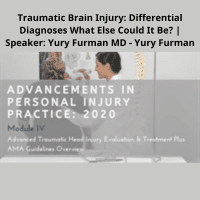Course Summary:
“Traumatic Brain Injury: Differential Diagnoses What Else Could It Be?” presented by Yury Furman MD, is a focused medical education course designed to equip healthcare professionals with the knowledge and skills necessary to accurately differentiate Traumatic Brain Injury (TBI) from other conditions that may present with similar symptoms. The course emphasizes the importance of a comprehensive diagnostic approach, considering various neurological, psychological, and medical conditions that can mimic the clinical presentation of TBI. Dr. Furman guides learners through key considerations, clinical indicators, and diagnostic strategies to ensure accurate diagnosis and appropriate management.
Target Audience:
This program is ideal for:
- Physicians (Neurologists, Emergency Medicine Physicians, Primary Care Physicians)
- Physician Assistants
- Nurse Practitioners
- Physical Therapists
- Occupational Therapists
- Speech-Language Pathologists
- Athletic Trainers
- Other healthcare professionals involved in the assessment and management of patients with suspected TBI.
Main Content:
The course likely covers key areas such as:
- Mimicking Conditions: Detailed exploration of various neurological disorders (e.g., stroke, concussion mimics, seizures), psychological conditions (e.g., PTSD, anxiety, depression), and medical conditions (e.g., migraines, vestibular disorders) that can present with symptoms similar to TBI.
- Clinical Assessment Strategies: Emphasis on key aspects of patient history, physical examination, and neurological evaluation to aid in differential diagnosis.
- Neuroimaging Interpretation: Guidance on interpreting neuroimaging findings (e.g., CT, MRI) and understanding when imaging can help differentiate TBI from other conditions.
- Neuropsychological Testing: Understanding the role and limitations of neuropsychological testing in the differential diagnosis of TBI.
- Case Studies: Review of real-world case scenarios to illustrate the complexities of differential diagnosis in TBI.
- Diagnostic Algorithms and Tools: Presentation of systematic approaches and tools that can assist clinicians in the differential diagnostic process.
- Red Flags and Critical Considerations: Identification of key clinical features that should raise suspicion for conditions other than or in addition to TBI.
- Communication and Collaboration: Strategies for effective communication with patients and collaboration with other healthcare professionals in the diagnostic process.
Enhance your diagnostic skills in Traumatic Brain Injury!
SIGN UP NOW







